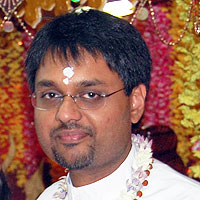Sanaatan Dharma has always stressed the importance of remembering and honouring our ancestors (purvaj) in a meaningful way. To this end, the period of Pitra Paksha, the dark fortnight in the month of Aashwin (September/October), is set aside for the remembrance of our departed ancestors (pitris). During this period, Hindus are advised to refrain from beginning any important projects, or from engaging in yagyas and major ceremonies such as the vivaah sanskaar (marriage) and the upanayan sanskaar (janeu).
Due to these necessary restrictions, however, there is often confusion and sometimes fear about pitra paksha. I wish to emphasize that it is not that this is an entirely inauspicious period, but rather, that it is very auspicious for offering worship in the name of our ancestors. It is important to note also, that all nitya karma, our essential daily worship including the offering of jal to Surya Dev and the lighting of the deeya at sandhya should continue as normal.
Our scriptures remind us that we all have five debts to repay, one of which is the enormous debt of gratitude we owe to our ancestors. One could never accurately measure the extent to which our modest but mighty forebears have influenced Hindu values and morals. They have engendered in us a sincere love and appreciation for our religion. The numerous religious and spiritual practices that they cherished and nurtured have provided an impetus for us to persist along the path towards spiritual perfection. And, significantly also, one cannot ignore the fact that the material wealth that many enjoy today is due largely to the effort and industry of our ancestors. Thus, there is the obvious need to show our gratitude for all that we have been blessed with by making special offerings in their name.
Furthermore, one of the five daily obligations (panch maha yagyas) of all Hindus is the performance of pitri yagya. This does not necessarily mean making physical offerings but may simply refer to the upholding of tradition or the continuance of spiritual practices bequeathed to us by our ancestors. This is said to be absolutely essential; yet today there seems to be a breakdown in the moral/ethical value system left by these extraordinary individuals. It is also meant to serve as a reminder, which is heightened during pitra paksha that we all exist at both the gross and subtle levels. The performance of these simple practices – such as facing south and offering tilanjali (water and black till) or engaging in pitri havan – all help to ease this passage from the physical to the subtle planes of existence. The giving of daan or charity in the name of the ancestors is said to also be very propitious at this time.
One must also understand that every offering that is made in the name of our departed ancestors is actually received by the Divine Lord – Aryamaa Pitra. What our ancestors receive are the blessings that would have accrued from such offerings. Shree Krishna states in Bhagavad Gita (Ch. 9.16) that “I am the offering to the departed….I am verily the act of performing oblations into the fire.” What greater acknowledgement of the efficacy of worship during pitra paksha is there than the Shree Krishna saying that He “is the offering to the departed”.
Pitra paksha offers us the unique opportunity to receive blessings while, at the same time, praying for the continued evolution and elevation of the souls of our departed loved ones. We pray that the souls of our ancestors may find peace and lasting fulfillment. I exhort all to observe Pitra Paksha from September 9 – 23, 2014.
By Pt. Ishwar Madho Maharaj


